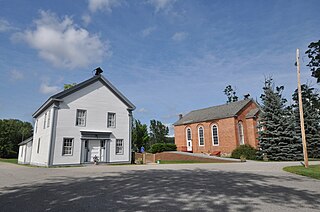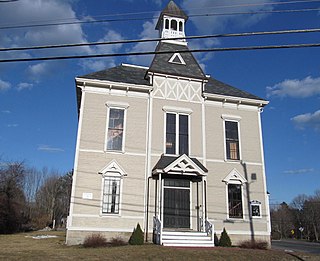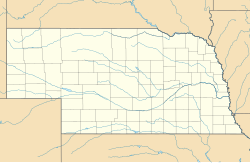
Town Hall Arts Center, formerly the Littleton Town Hall, is located in downtown Littleton, Colorado and has been a local professional theatre, producing comedies, musicals and plays to the Denver metropolitan area for over 30 years. The building was designated a National Register of Historic Places on September 4, 1980.

Pupin Physics Laboratories, also known as Pupin Hall, is home to the physics and astronomy departments of Columbia University in New York City. The building is located on the south side of 120th Street, just east of Broadway. In 1965, Pupin was named a National Historic Landmark for its association with experiments relating to the splitting of the atom, achieved in connection with the later Manhattan Project. In 2009 the American Physical Society named Pupin Hall a historic site and honored Isidor Isaac Rabi for his work in the field of magnetic resonance.

The former Reading Municipal Building is a historic building at 49 Pleasant Street in Reading, Massachusetts. Built in 1885, this two-story brick building was the town's first municipal structure, housing the town offices, jail, and fire station. In 1918 all functions except fire services moved out of the building. It now serves as Reading's Pleasant Street Senior Center. The building was listed on the National Register of Historic Places in 1984.

The Greenwich Senior Center, formerly Greenwich Town Hall, is a historic municipal building at 299 Greenwich Avenue in the business district of Greenwich, Connecticut. USA. Built in 1905, it is a prominent local example of Beaux Arts architecture, and served as the town's center of government until 1977. The building was added to the National Register of Historic Places on May 21, 1987.

The Golden Rod Grange No. 114 is a historic Grange hall on New Hampshire Route 32 in Swanzey, New Hampshire, United States. Built in 1916, it continues to occupy a significant place in the community as a meeting and function space. The little-altered building was listed on the National Register of Historic Places in 1994. It is now owned by the town and maintained by the Swanzey Preservation Society.

The Town Hall of Sandwich, New Hampshire, is located at 8 Maple Street in the village of Center Sandwich. Built in 1913, it is a handsome example of Colonial Revival architecture, and has been a prominent focal point of the town's civic and social life since its construction. The building was listed on the National Register of Historic Places in 1980.

The New Ipswich Town Hall is a historic academic and civic building on Main Street in the center village of New Ipswich, New Hampshire. The 1+1⁄2-story wood-frame structure was built in 1817 to serve the dual purpose of providing a town meeting place, and to provide space for a private academy. The building has been little altered since 1869, when it was substantially reconfigured solely for town use. The building was listed on the National Register of Historic Places in 1984.

The Wakefield Town Hall and Opera House is a historic municipal building at 2 High Street in the Sanbornville village of Wakefield, New Hampshire. Built in 1895, it is a prominent local example of Romanesque architecture, and has housed civic and social activities since its construction. The building was listed on the National Register of Historic Places in 2007, and the New Hampshire State Register of Historic Places in 2002.

Charlestown Town Hall is the seat of municipal government of Charlestown, New Hampshire. It is located just off Main Street at 29 Summer Street. It was built in 1872-73, and is a design of Edward Dow, one of New Hampshire's leading architects of the period. The building was listed on the National Register of Historic Places in 1984, and is a contributing property to the Charlestown Main Street Historic District.

The Franklin Block is a historic commercial building at 75 Congress Street in downtown Portsmouth, New Hampshire. Built in 1879, this three-story brick building is the largest Victorian-era building standing in the city. It occupies the city block between Fleet Street and Vaughan Mall, a former street that is now a pedestrian mall. It was listed on the National Register of Historic Places in 1984.

Stevens Memorial Hall is the historic town hall of Chester, New Hampshire. The building, a large wood-frame structure completed in 1910, is located in the center of Chester at the junction of New Hampshire Routes 121 and 102. The building was listed on the National Register of Historic Places in 2004. It served as the center of the town's civic business until 2000, when town offices were relocated to a former school.

The Deerfield Town House is the town hall of Deerfield, New Hampshire. Built in 1856, it is one of the state's finest examples of public Greek Revival architecture. The building was listed on the National Register of Historic Places in 1980, as "Town House".

Pawlet Town Hall houses the municipal offices of the town of Pawlet, Vermont. Located at 122 School Street in the village center, it was built in 1881 as a combined town hall, meeting and performance venue, and retail establishment. It has served as town hall since its construction, and is a good local example of late Italianate architecture. It was listed on the National Register of Historic Places in 1995.

The West Rutland Town Hall is located at Main and Marble Streets in the village center of West Rutland, Vermont. Built in 1908-09, it is a fine and restrained example of Colonial Revival architecture, and originally housed town offices, the public library, and a community meeting space. It was listed on the National Register of Historic Places in 1983.

Reading Town Hall, the town hall of Reading, Vermont, is located at the junction of Vermont Route 106 and Pleasant Street in the village of Felchville. Built in 1915 as a gift from a native son, the barn-like structure is a fine local example of Colonial Revival architecture, and has been a center of local civic activity since its construction. It was listed on the National Register of Historic Places in 1996.

The School House and Town Hall is a historic municipal building on Schoolhouse Road, just west of United States Route 7 in the center of Leicester, Vermont. Built about 1858, it is a fine example of late Greek Revival architecture, and is the town's best-preserved district schoolhouse. Its upper floor has served as the town hall since its construction. It was listed on the National Register of Historic Places in 1988.

Salisbury Town Hall is a historic municipal building at Maple and Prospect streets in Salisbury, Vermont. Built in 1869, it is a fine local example of Greek Revival architecture, and has served the rural community in a variety of ways: as town hall, library, and as educational facility. It was listed on the National Register of Historic Places in 1995.

The Cornwall Town Hall is located at 2629 Vermont Route 30 in Cornwall, Vermont. Built in 1880 and enlarged in 1905 to also house the local Grange chapter, it is one of the rural community's few examples of Italianate architecture, and has served as a community meeting point since its construction. It was listed on the National Register of Historic Places in 1986.

Worcester Town Hall is the historic center of civic activity in Worcester, Vermont. Built in 1912 at the center of the rural community's main village, it has served since then as home to the community's town meetings, and for social gatherings and events. It was listed on the National Register of Historic Places in 2005.

Centennial Hall is a historic community hall and schoolhouse at 105 Post Road in North Hampton, New Hampshire. Built in 1876, it is a distinctive local example of Stick Style architecture, and has served the town as a schoolhouse and community meeting place for most of its existence. It was listed on the National Register of Historic Places in 1980.






















